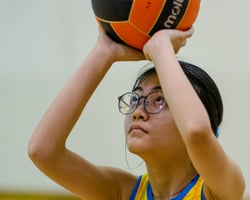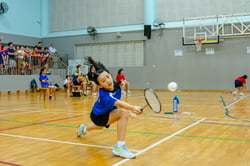The role of cognitive training and mental alertness in sport
 Athletes training on the Dynavision aka D2 (Source : SSI)
Athletes training on the Dynavision aka D2 (Source : SSI)
By Chern Hui Ying
Heard of the old-wives’ tale about having to stay mentally active as a reason to play mahjong or chess? Let’s find out today whether it is a fact!
Being mentally active involves one’s cognitive ability, a “mental capability” that “involves the ability to reason, plan, solve problems, think abstractly, comprehend complex ideas, learn quickly and learn from experience” (Gottfredson, 1997). Cognitive ability has been found to predict work performance, regardless of the job one holds (Hunter, 1986) and possibly even increase your life expectancy (Bijwaard, van Kippersluis, Veenman, 2015). Generally, cognitive training can help in developing attentional focus, improving one’s memory, and even facilitating the process of rational decision-making.
Sport-context
What we see during a game is just what can be observed from the outside. Have you ever wondered what was going on in the minds of our Team Singapore athletes during a game? Imagine yourself as a football player: standing in the field, with more than 2,000 pairs of eyes watching, as your team and you compete in the biggest game you have ever played. You feel the excitement and pressure of representing your country. With 5 minutes left in the game, your team just needs to score 1 more goal to reach the semi-finals - something your country has not had the chance to do so in the last 20 years!
After having already played for 88 minutes, you are feeling physically exhausted. You keep telling yourself, “Mind over matter”. With just 2 minutes left on the clock and blurry vision from the adrenaline, the ball is passed to you. As you run towards the goal, you see your opponents and both your midfielder and striker are open. Your forward though, had just injured his foot. But he is more likely to score than your midfielder. Who do you choose to pass the ball to?
Being able to analyse the game, the environment, and from past experiences to make a decision in just a few seconds despite both physical and mental exhaustion requires cognitive ability. Can you think of how cognitive ability can affect the performance of athletes in other sports?
Here at Singapore Sport Institute (SSI)
There are many ways to train up one’s cognitive ability. We will be sharing 2 of the many ways used by sport psychologists in SSI.
In between or after some intense physical training, athletes would come into the psychological lab for some intense cognitive training. First, we have our wall “decorations” that serve a purpose beyond just beautifying the room. Different tasks are given each time to train our athletes’ cognitive ability, for example, athletes would be tasked to “find the number of people in striped shirts as fast as possible” or “find the female carrying a bag as fast as possible”.
 One of our walls in the lab for cognitive training (Source: SSI)
One of our walls in the lab for cognitive training (Source: SSI)
Second, we use a machine called the Dynavision (also known as D2) with our athletes. We use a “dual task training paradigm” where the athlete must perform 2 tasks - a reaction time task and a cognitive task - simultaneously.
 The Dynavision aka D2 (Source : SSI)
The Dynavision aka D2 (Source : SSI)
For example, the athletes would complete a go/no-go task where they have to press only the buttons that light up in green, therefore training their reaction time and peripheral vision. They would also have to solve some mathematical questions shown on the T-scope (small screen on the equipment). The D2 is used widely, and if you are interested to find out more about how D2 is used globally, check out “The use of Dynavision in sport and exercise research: A review.” by Nathanael Ong (2018), a sport psychologist previously with SSI.
Application to general population
Below are just 3 of the possible resources and suggestions which you can use to train your cognitive ability. There are many platforms and resources available, so if you find that the resources we provided do not suit your needs, feel free to find something else that works best for you!
Games (Physical)
There are many physical games that can be enjoyed as a game itself while simultaneously practicing some of your cognitive skills. For example, Card Flip Memory Game (https://www.helpfulgames.com/subjects/brain-training/memory.html), Sudoku, Chess, and even Scrabble.
Have fun with your family while at it!
Lumosity (Phone application)
Want to train your cognitive ability on-the-go? Well, Lumosity might be the one for you. It is a phone application with many fun games which would appeal to people of all age groups.
BrainGymmer (Website)
Whether you want to improve your working memory, improve your concentration, or improve your mental flexibility, BrainGymmer’s website (https://www.braingymmer.com/en/) provide many games for you for free! Do sign up for an account if you like to save your scores!
Cognitive training plays a big part in sports, yet it can be fun too, whether it is for athletes or for you and me.
References
Bijwaard, G. E., van Kippersluis, H., & Veenman, J. (2015). Education and health: The role of cognitive ability. Journal of Health Economics, 42, 29–43. doi:10.1016/j.jhealeco.2015.03.003
Gottfredson, L. S. (1997). Mainstream science on intelligence: An editorial with 52 signatories, history, and bibliography.
Hunter, J. E. (1986). Cognitive ability, cognitive aptitudes, job knowledge, and job performance. Journal of Vocational Behavior, 29(3), 340–362. doi:10.1016/0001-8791(86)90013-8
Ong, N. C. H. (2018). The use of Dynavision in sport and exercise research: A review. International Journal of Sport and Exercise Psychology, 1–20. doi:10.1080/1612197x.2018.1549582
About Us
The Sport Psychology Department at the Singapore Sport Institute (SSI) provides comprehensive, holistic, and evidence-based psychology services to support coaches and sporting programmes in empowering individuals and teams to achieve peak performance. Sport psychology plays a critical role in performance enhancement as well as developing and maintaining athletes’ well-being within the competitive sports environment.
Related Articles
Related Topics
Recent Events & Programmes
Related Articles
Related Topics
Related Articles
View All
Related Topics
[BlogPost 164749641842 NSG 2024 Netball: Senior Div Girls League 3 Preliminary Round 2, BlogPost 163985727414 Beyond the Field: Exciting Sports Careers for Non-Athletes, BlogPost 164438712123 NSG 2024 Badminton: Senior Div Girls Quarter-Finals, BlogPost 164238055490 Evergreen Aleksandar Duric Still Making Headlines at 53, BlogPost 164170080646 NSG 2024 Rope Skipping: Junior Div Girls Freestyle Team Finals, BlogPost 162884973666 Move and Rest Better With Data From Your Own Body, BlogPost 163393049482 Life Comes Full Circle For Serangoon Garden Secondary School's Fahrish Khan, BlogPost 163258797651 Making Golf a Sport for All, BlogPost 162512222328 NSG 2024 Sepaktakraw: Senior Div Yuhua Primary School vs Qihua Primary School, BlogPost 162233592997 Gritty Lions Suffer Loss to China, BlogPost 162089384371 On Your Mark, Get Ready, Go Running, BlogPost 161670652697 Lions' Excellent Showing Against China, BlogPost 161435270031 Ogura Optimistic for Exciting Clash against China, BlogPost 161127614758 The Future of Basketball in Singapore: Why 3x3 is Here to Stay, BlogPost 161033673012 The Active Lifestyler's Guide to the New ActiveSG Delta Sport Centre, BlogPost 161128356680 Grand New Champions Crowned at WTT Singapore Smash 2024, BlogPost 160844835218 NSG 2024 Table Tennis: C Div Boys Pool Round, BlogPost 160210745115 NSG 2024 Basketball: Senior Div Girls Tampines Primary School vs Frontier Primary School, BlogPost 159881180544 Whirlwind Return to Women's Football, BlogPost 159633541417 Singapore Smash to Elevate a New Legacy, BlogPost 158983580420 NSG 2024 Rugby: B Div Damai Secondary School vs Peirce Secondary School, BlogPost 159003960202 SFA Fiesta: Kicking off 2024 to a Roaring Start, BlogPost 158830735126 NSG 2024 Football: B Div Girls Preliminary Round Meridian Secondary School VS Bowen Secondary School, BlogPost 158536989718 Team Nila Volunteers Recognized At Awards Ceremony, BlogPost 158270107806 NSG 2024 Hockey: B Div Boys Preliminary Round Raffles Institution VS St. Hilda Secondary School, BlogPost 157966862615 NSG 2024 Floorball: B Division Preliminary Rounds Kick Off!, BlogPost 157562433712 What Is Safe Sport?, BlogPost 157559446197 Sengkang Secondary: Cultivating Well-Rounded Footballers, BlogPost 157368261167 New National Training Centre for Cricket at West Coast Ground, BlogPost 155340164987 Active Ageing with Joey Bonifacio, BlogPost 155930815517 Inaugural Singapore Youth League kicks off from 24th February 2024, BlogPost 155340164727 Bukit Canberra : the Coolest Spot in the North, BlogPost 155368905255 How Padang Fandi Inspired Ayden to Chase his Dream, BlogPost 154755572826 Ageing Backwards with Elizabeth Cheang, BlogPost 154094657315 Running For Fitness, BlogPost 153318636178 Excitement Builds for FIBA 3x3 Asia Cup 2024, BlogPost 153198644247 World's Top Four Confirmed for 2024 HSBC Women's World Championship, BlogPost 149413941770 Cultivating Your Kids’ Interest in the Outdoors, BlogPost 149413941163 Making Sport More Appealing for Our Kids, BlogPost 149412549409 Solo Or Team Sport – Choosing the Best for Your Child, BlogPost 151197478798 Former Lions Stalwart Baihakki Khaizan Sheds Light on New Accreditation to Elevate Grassroots Football and Youth Development, BlogPost 80703591291 New Year, Fitter You! Here are the top 3 workouts for the New Year, BlogPost 81171151456 7 Reasons Why Sports are Great for Children’s Mental Health, BlogPost 80542065330 17 Best Yoga Classes & Studios in Singapore [+ Rating & Prices], BlogPost 149404351798 From Brush to Lens: A Student's Journey in the World of Art and Sports Photography, BlogPost 149402825063 The Benefits of Active Parenting, BlogPost 149397832009 Sweden Claim 9th Straight Gold at the Women's World Floorball Championship, BlogPost 149397831449 Lion City Sailors Win 2023 Singapore Cup, BlogPost 148511324266 Pitch Perfect with Jonathan Teo, BlogPost 148511724402 Seniors: Increase your flexibility bit by bit with these stretches]










